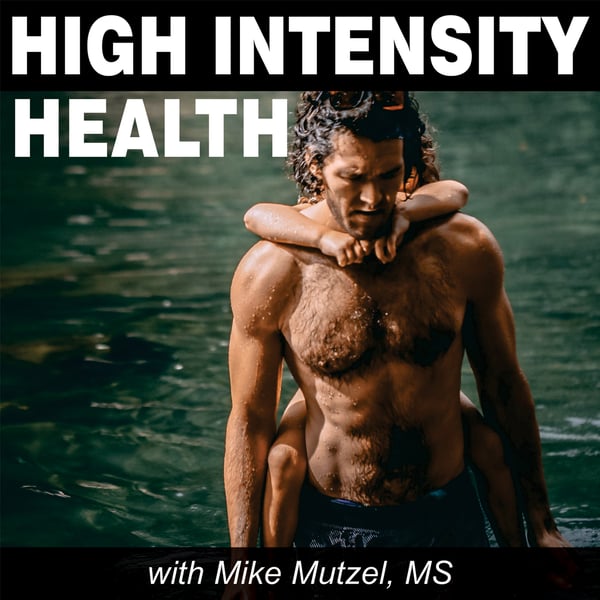Low Muscle Mass: Common in Cancer, Heart Disease
High Intensity Health with Mike Mutzel, MS
Mike Mutzel
4.8 • 1.2K Ratings
🗓️ 29 March 2023
⏱️ 12 minutes
🧾️ Download transcript
Summary
Low muscle mass is higher than expected in people recently diagnosed with cancer and cardiovascular disease. Resistance exercise and nutrition may help prevent these chronic diseases.
Support your Workout Sessions and Healthy Hydration with this Creatine Electrolyte Combo by MYOXCIENCE: http://bit.ly/electrolyte-stix
Save 12% with code podcast at checkout
Link to research & images: https://bit.ly/3ZH5Ok1
References:
Morlino, D. et al. Prevalence of Sarcopenia in Women with Breast Cancer. Nutrients 14, 1839 (2022).
Jeznach-Steinhagen, A. et al. Higher Muscle Mass and Higher Serum Prealbumin Levels Are Associated with Better Survival in Hemodialysis Patients during a Five-Year Observation Period. Nutrients 15, 1237 (2023).
Key Takeaways:
00:36 Muscle enhances survivability from chronic disease.
01:10 There was a significant survival benefit from higher quantities of muscle. In chronic kidney disease.
02:00 Resistance training enhances longevity and prevents a variety of disease states.
02:10 Independent of fat mass, survival was higher in those with higher muscle mass.
02:45 Lower muscle mass reflected a worse survival rate in dialysis patients.
03:30 A sudden drop in albumin is an ominous marker, indicating lower survival rates.
07:20 Sarcopenia is found in 14% of breast cancer patients and 1 in 3 had pre-sarcopenia.
08:30 People with low muscle mass have a higher toxicity associated with chemotherapy drugs and have worse outcomes.
10:02 We need to prioritize protein, sleep, recovery, and intense physical activity that involves resistance training.
10:50 Loss of lean mass better predicts a cardiovascular event compared to fat gain.
Transcript
Click on a timestamp to play from that location
| 0:00.0 | As you likely know by now, muscle mass is very protective. |
| 0:02.7 | In today's show, we're going to talk about two recently published studies that found |
| 0:05.2 | that muscle mass helps enhance survival and reduces the odds of death in people who |
| 0:09.8 | have chronic kidney disease as well as breast cancer. |
| 0:12.7 | Now, I'm not the only one that's been talking about this. |
| 0:14.8 | We know Dr. Gabriel Alliance, Sean Baker. |
| 0:16.9 | Many other people have been highlighting the important protective effect of muscle tissue, |
| 0:21.4 | not just highlighting the deleterious effects of increased fat mass. |
| 0:24.9 | It seems that as a society, many people are focused on weight loss, on losing fat, |
| 0:29.4 | losing weight, but really should be shifting our framework in the paradigm to supporting |
| 0:34.6 | muscle mass because it turns out that in people with chronic disease such as breast cancer |
| 0:39.4 | or chronic kidney disease, the amount and independent effect of muscle that it has or |
| 0:44.7 | in parts on enhancing survivability in these complex chronic disease states is now |
| 0:49.6 | quantifiable. |
| 0:50.6 | And today, we're going to talk more about that, particularly in patients with chronic |
| 0:53.9 | kidney disease. |
| 0:54.9 | I know this title is a little bit jargonistic, but let's talk about this paper titled, |
| 0:58.5 | Higher Muscle Mass and Higher Serum Pre-Albumin Levels are associated with better survival |
| 1:03.8 | in hemodialysis patients during a five-year observational period. |
| 1:07.4 | Now, essentially what these researchers found is when looking at muscle mass using a bio-impedance |
| 1:13.6 | analysis, so this is something that you can readily do at most gyms and fitness centers |
| 1:17.5 | now, is look at a bio-impedance, which looks at phase angle. |
... |
Please login to see the full transcript.
Disclaimer: The podcast and artwork embedded on this page are from Mike Mutzel, and are the property of its owner and not affiliated with or endorsed by Tapesearch.
Generated transcripts are the property of Mike Mutzel and are distributed freely under the Fair Use doctrine. Transcripts generated by Tapesearch are not guaranteed to be accurate.
Copyright © Tapesearch 2025.

